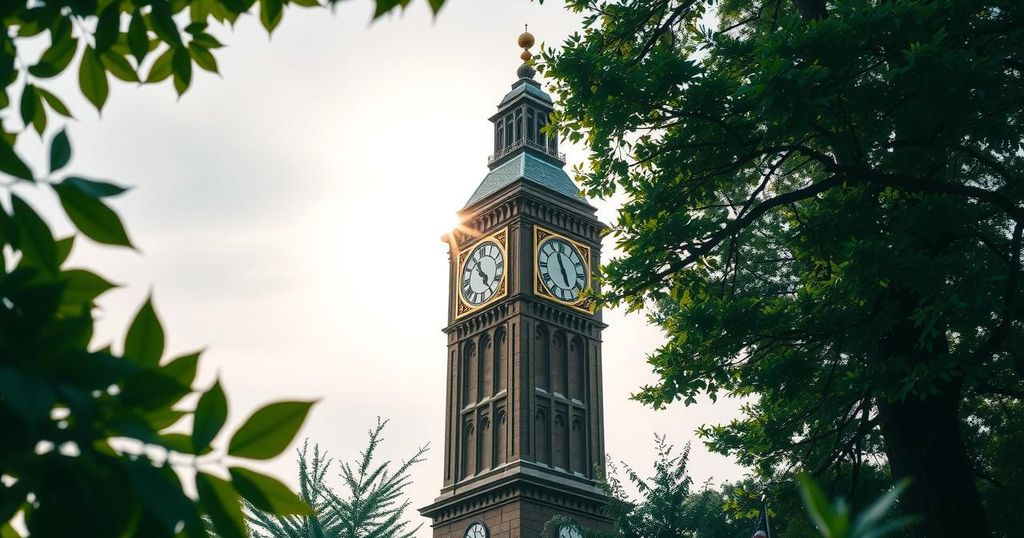Cameroon Elections 2025: Paul Biya’s Continued Dominance Amidst Challenges

As Cameroon prepares for elections in 2025, 91-year-old President Paul Biya is expected to run for an eighth consecutive term, raising concerns about his health and governance capabilities. Critics argue that a fragmented opposition and deep-rooted corruption hinder the emergence of viable alternatives. Economic challenges persist, complicating the political landscape as the nation’s future hangs in the balance.
As Cameroon approaches its scheduled elections in 2025, President Paul Biya, aged 91, is likely to seek an eighth consecutive term, solidifying his status as Africa’s longest-serving leader. Political commentators, such as Dr. John Akpo, assert that discussions of Biya’s candidacy are settled, notwithstanding ongoing concerns regarding his health. Despite some support from opposition factions, the authenticity of their allegiance is questioned, with allegations that these parties were established to dilute genuine opposition interests.
Biya has presided over Cameroon for over 42 years, and should he win re-election, he would be nearing 99 years old by the next electoral cycle in 2032. The president’s age raises concerns about his ability to govern effectively, particularly regarding escalating civil unrest linked to the Anglophone separatist crisis, which has severely affected the country’s economy. Critics, including opposition lawyer Tamfu Richard, suggest that Biya’s advanced age prohibits him from engaging directly with crisis regions, jeopardizing potential resolution efforts.
Biya’s Cameroon People’s Democratic Movement (CPDM) relies on coalition partners like the Democratic Movement for the Defense of the Republic (MDR) and a faction of the Union of the Populations of Cameroon (UPC) to sustain parliamentary control. However, both allied parties have seen diminished support; notably, MDR won only one parliamentary seat in the 2020 elections, while UPC had been barred from participation. Their relevance remains crucial to the ruling party’s governance amid rising competition from the opposition.
Recent discussions among Catholic bishops in Cameroon have suggested a call for improved governance and living conditions. Church officials have denied any demands for Biya’s resignation, asserting that their focus is on national well-being rather than conflict with the state. The Church’s influence in Cameroon aligns with its predominantly Catholic populace, and any statements made could sway public sentiment towards political leaders.
The economic condition in Cameroon has shown modest signs of recovery, but overall growth remains sluggish. According to the World Bank, real GDP growth fell to 3.3% in 2023, while inflation, fiscal constraints, and internal conflicts pose significant challenges. Despite a slight rebound recorded in early 2024, poverty reduction efforts have stagnated, with approximately 23% of the population living below the extreme poverty line. Corruption remains a substantial issue, with critiques stating that personal interests overshadow public welfare in government activities.
Cameroon grapples with numerous structural deficiencies, including inadequate infrastructure and a reliance on commodity exports. Experts suggest that addressing these issues is essential for fostering sustainable growth and tackling poverty; however, the potential for reform under another Biya presidency is uncertain. The divided opposition, marked by internal strife, has not provided clear alternatives for governance, complicating the political landscape as the election draws near. Opposition figures continue to question Biya’s capability to fulfill presidential responsibilities at his advanced age, emphasizing the need for change amid a landscape of entrenched power dynamics.
The political landscape in Cameroon is heavily dominated by President Paul Biya, who has led the country for an unprecedented period since 1982. As the country approaches elections in 2025, various political commentators and stakeholders are considering the implications of Biya’s potential candidacy for an eighth term. The political situation is complicated by ongoing civil unrest, economic stagnation, and concerns regarding governance amid the president’s advanced age. With a fragmented opposition and coalition dynamics, the coming elections may further entrench Biya’s long-standing rule.
In summary, Paul Biya’s anticipated candidacy for another term raises significant concerns regarding governance capacity at the age of 91, particularly amid ongoing crises and economic challenges in Cameroon. As the opposition struggles to present a united front against the ruling CPDM, the potential for sustainable political change remains uncertain. The situation is exacerbated by corruption and governance issues, leaving many Cameroonians questioning the future under Biya’s continued presidency.
Original Source: www.dw.com








